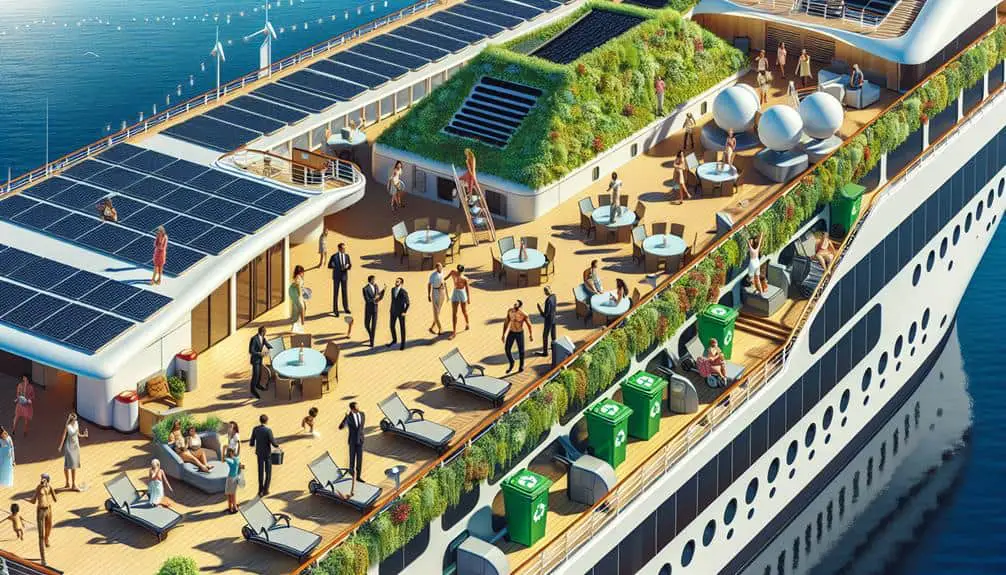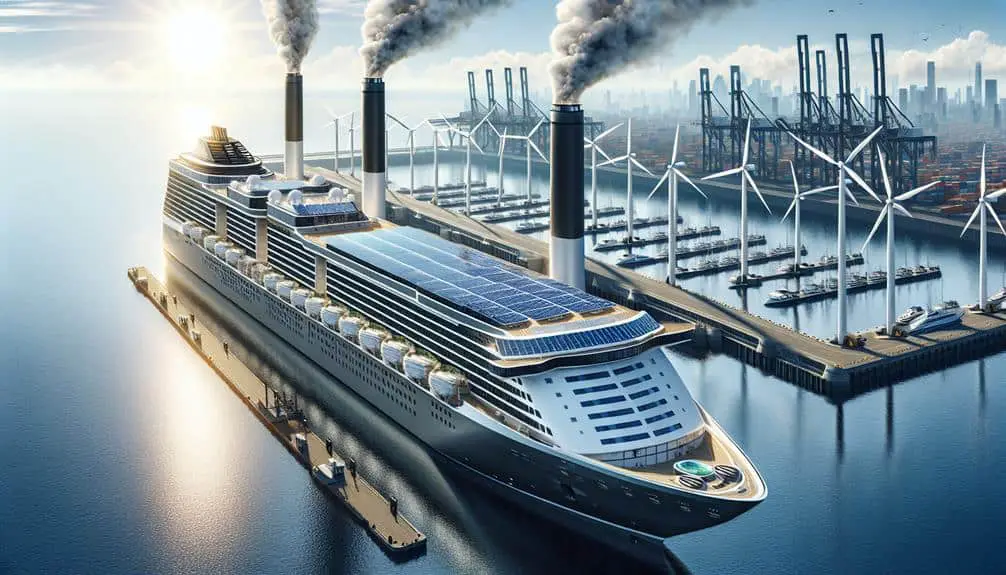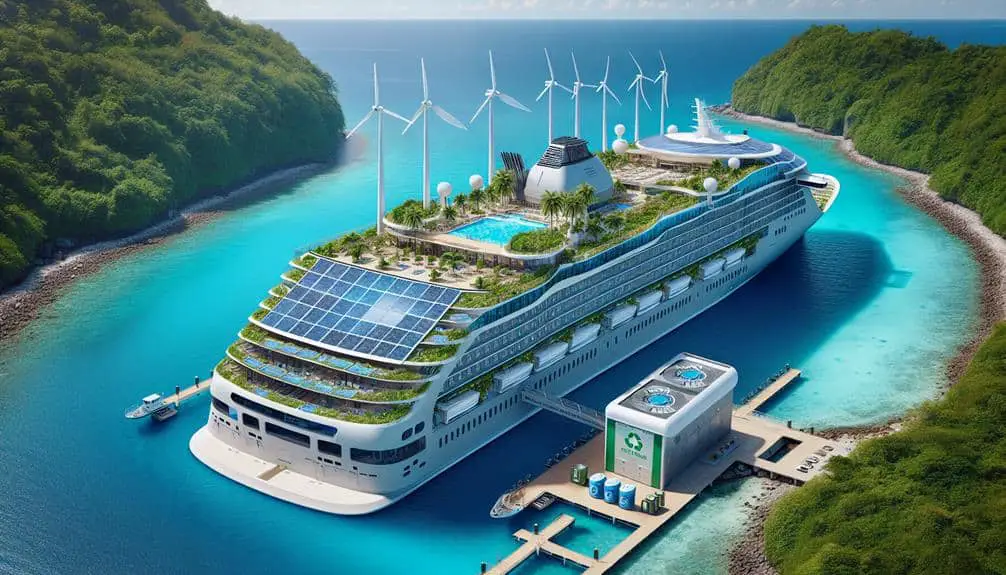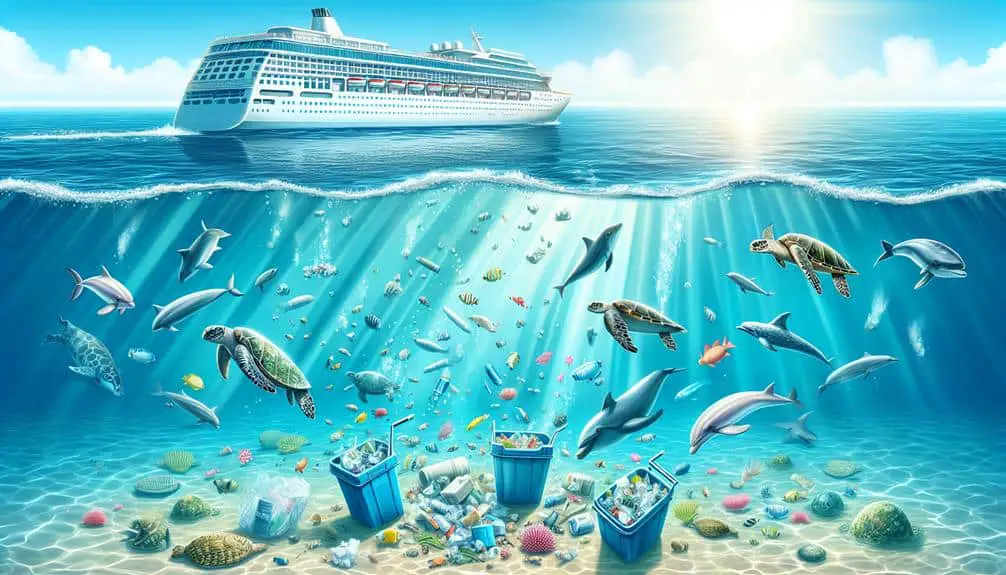To achieve eco-friendly luxury on cruise ships, prioritize sustainable dining with local ingredients, minimize waste, and offer plant-based menus. Opt for energy-efficient ship designs utilizing solar power and hybrid systems. Choose eco-friendly excursions, support conservation, and engage in sustainable activities. Implement waste reduction strategies like composting and reusable materials. Green onboard practices include LED lighting, energy-efficient systems, and renewable energy sources. Foster responsible port partnerships for energy-efficient infrastructure and waste management. Engage with the community through environmental initiatives and support local businesses. When considering achieving eco-friendly luxury on cruise ships, focusing on these seven tips guarantees a luxurious and sustainable experience.
Key Points
- Prioritize locally sourced, plant-based menus for sustainable dining luxury.
- Incorporate solar power and hybrid propulsion for energy-efficient ship design.
- Choose eco-friendly excursions supporting conservation efforts.
- Implement waste reduction strategies like composting and reusable materials.
- Adopt green onboard practices with LED lighting and renewable energy sources.
Sustainable Dining Options
To enhance your eco-friendly luxury cruise experience, opt for sustainable dining options that prioritize locally sourced ingredients and minimize food waste. Choosing restaurants on board that focus on local sourcing not only supports nearby communities but also reduces the carbon footprint associated with transporting food long distances.
Look for plant-based menus that offer delicious and nutritious meals while markedly lowering the environmental impact of your dining choices. By selecting dishes rich in fruits, vegetables, grains, and legumes, you contribute to conserving water, reducing greenhouse gas emissions, and protecting biodiversity.
Embracing sustainable dining practices not only benefits the environment but also enhances the overall quality of your culinary experience. You can enjoy fresh, seasonal ingredients bursting with flavor and nutrients while knowing that your choices align with your eco-conscious values. Opting for locally sourced, plant-based menus on your luxury cruise is a smart and responsible way to savor exquisite meals while minimizing your environmental footprint.
Energy-Efficient Ship Design
For an eco-friendly luxury cruise experience, consider the significant impact of energy-efficient ship design on reducing environmental footprint and enhancing sustainability efforts.
When it comes to energy-efficient ship design, integrating technologies such as solar power and hybrid propulsion systems can lead to substantial reductions in fuel consumption and greenhouse gas emissions.
Solar power, harnessed through solar panels installed on the ship's surface, can provide a renewable source of energy to power various onboard operations.
Hybrid propulsion systems, which combine traditional fuel-powered engines with electric propulsion, offer increased efficiency and lower emissions by optimizing power usage based on operational requirements.
Eco-Friendly Excursions
When planning eco-friendly excursions during your luxury cruise, prioritizing sustainable activities and responsible tourism practices can significantly contribute to minimizing environmental impact. Opting for eco-friendly activities such as snorkeling or kayaking in marine-protected areas, hiking in designated trails, or participating in beach clean-up initiatives are excellent choices. These activities not only allow you to appreciate nature but also actively support conservation efforts.
Responsible tourism practices like respecting wildlife, following designated paths, and avoiding single-use plastics can help preserve the delicate ecosystems you visit. Choosing tour operators with eco-certifications or partnerships with local conservation organizations guarantees that your excursions align with sustainable principles.
Waste Reduction Strategies
Implementing efficient waste reduction strategies onboard luxury cruise ships is essential to minimizing environmental impact and promoting sustainability.
One effective strategy is the implementation of a composting program. Organic waste from food scraps and other compostable materials can be collected and processed onboard, reducing the amount of waste sent to landfills. This not only decreases greenhouse gas emissions but also produces nutrient-rich compost that can be used in onboard gardens or donated at ports of call.
Another key approach is the incorporation of reusable materials. By using durable and high-quality items that can be washed and reused, cruise ships can greatly cut down on single-use plastics and other disposable products. This not only reduces waste generation but also lowers the overall environmental footprint of the cruise industry.
Green Onboard Practices
To further enhance sustainability efforts onboard luxury cruise ships, adopting green onboard practices is paramount for reducing environmental impact and fostering eco-friendly operations. Implementing advanced green technology can greatly decrease carbon emissions. For instance, utilizing LED lighting throughout the ship can reduce energy consumption by up to 80% compared to traditional lighting systems.
Installing state-of-the-art air conditioning and ventilation systems that are energy-efficient can also contribute to minimizing carbon footprints. Another effective practice is the use of seawater desalination systems to provide clean water for various onboard operations, reducing the reliance on single-use plastics.
Furthermore, incorporating solar panels on the ship's exterior can harness renewable energy sources to power certain functions, thereby decreasing the demand for non-renewable fuels. By optimizing onboard practices with green technology, luxury cruise ships can make substantial progress towards achieving eco-friendly operations and significantly reduce their environmental impact.
Responsible Port Partnerships
For luxury cruise ships aiming to enhance sustainability efforts and reduce environmental impact, forging responsible port partnerships is a strategic imperative. Collaborating with ports that share your commitment to environmental stewardship can greatly reduce the carbon footprint of your operations.
Here are four key ways responsible port partnerships can help mitigate environmental impact and uphold corporate responsibility:
- Energy-Efficient Infrastructure: Ports equipped with energy-efficient facilities and practices can support cruise ships in minimizing their energy consumption during docking, reducing greenhouse gas emissions.
- Waste Management Solutions: Partnering with ports that have robust waste management systems in place enables cruise ships to properly handle and dispose of waste, contributing to a cleaner marine environment.
- Water Conservation Initiatives: Ports implementing water conservation measures can assist cruise ships in efficiently managing their water usage, promoting sustainability across operations.
- Alternative Fuel Options: Seeking port partners that offer access to alternative fuel sources can aid luxury cruise ships in reducing their reliance on traditional fossil fuels, thereby lowering their environmental impact.
Community Engagement Initiatives
Engaging local communities through collaborative initiatives enhances the social and environmental impact of luxury cruise operations. Sustainable tourism practices emphasize the importance of involving communities in cruise activities to guarantee a positive relationship with the environment and local residents. By actively engaging with communities, cruise lines can foster a sense of environmental stewardship among locals and tourists alike.
One effective community engagement initiative is partnering with local organizations to organize beach clean-ups or conservation projects. These activities not only benefit the environment but also create a sense of shared responsibility for preserving natural habitats. Additionally, supporting local businesses and artisans through onboard showcases or excursions promotes economic sustainability within the community.
Measuring the success of community engagement initiatives can be done through surveys to assess the satisfaction levels of both residents and tourists. Tracking participation rates in community activities and monitoring the environmental impact of these initiatives also provides valuable data for continuous improvement. By prioritizing community engagement, luxury cruise ships can contribute to sustainable tourism practices and environmental stewardship while enhancing the overall guest experience.
Frequently Asked Questions
Are There Any Options for Eco-Friendly Shopping on Board Cruise Ships?
Looking for eco-friendly shopping on board cruise ships? Wonder no more! Discover a range of options like eco-friendly souvenirs and sustainable dining choices. Make a positive impact while enjoying your luxurious cruise experience.
How Does the Cruise Ship Handle Waste From Onboard Activities Like Spa Treatments or Entertainment?
When it comes to waste disposal and sustainability on cruise ships, handling waste from activities like spa treatments involves a focus on recycling. The cruise ship's system guarantees that materials from these activities are sorted and processed efficiently to minimize environmental impact.
What Measures Are in Place to Reduce Water Consumption on Cruise Ships?
To reduce water consumption on cruise ships, advanced systems like greywater recycling and energy-efficient technologies are employed. By implementing these measures, cruise lines can not only enhance energy efficiency but also contribute meaningfully to water conservation efforts.
Are There Any Initiatives in Place to Support Local Communities at Port Destinations?
Wondering about community support initiatives at port destinations? Cruise lines actively engage in local projects, from educational programs to cultural exchanges, fostering sustainability and positive relationships. Get involved and make a difference on your next voyage.
How Are Crew Members Trained to Uphold the Ship's Eco-Friendly Practices?
Crew members receive thorough training on eco-friendly practices, including waste management, energy conservation, and sustainable operations. Environmental initiatives are integrated into crew protocols, ensuring a collective commitment to preserving the environment while delivering high-quality luxury experiences.




